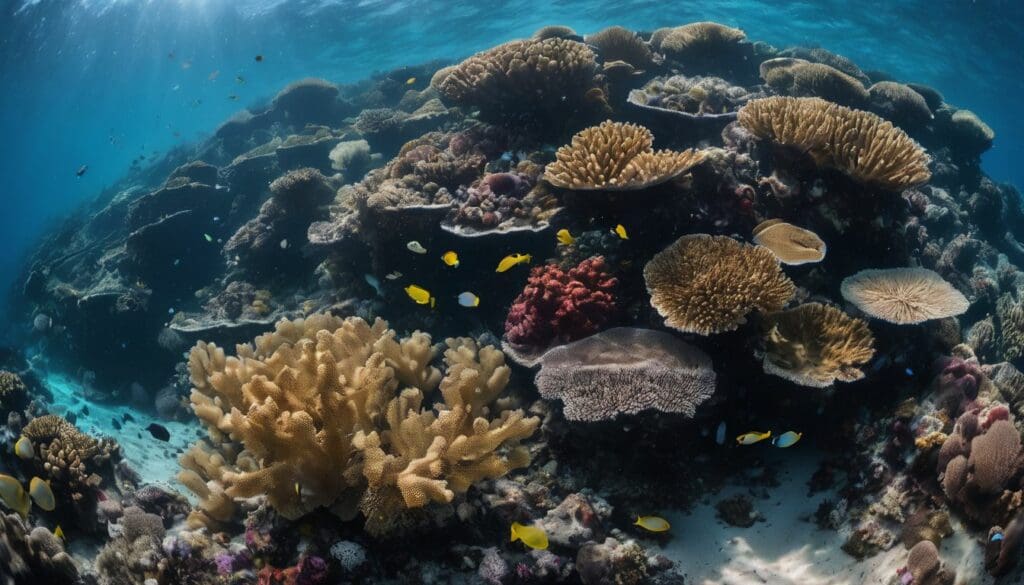Many of us grapple with why some people resist accepting climate change despite mounting evidence. It’s startling that while 97% of climate scientists agree on the human impact driving global warming, a significant portion of the public remains sceptical.
This blog delves into the psychological mechanisms behind this denial and offers insights to better understand and address these attitudes. Keep reading to uncover why climate change denial persists in today’s society.
Key Takeaways
- Climate change denial is influenced by psychological barriers like cognitive dissonance, where the reality of climate evidence conflicts with existing beliefs, and distance in time and space which makes it hard to connect today’s actions with future consequences.
- Different forms of climate change denial exist, including soft denial where individuals acknowledge the problem but downplay its severity, and hard denial where there is an outright rejection of scientific evidence.
- Thinking errors such as all-or-nothing thinking, expecting linear progress in a complex world, and overlooking nuanced grey areas contribute to entrenched views on climate change.
- Open discussion and addressing fear are crucial strategies for overcoming psychological resistance to accepting the evidence of climate change. Focusing on shared values can foster greater engagement in environmental action.
- Recognising personal biases like optimism bias—believing negative impacts will not affect oneself—and political or cultural influences can help understand why some continue to deny the urgency of climate action.
Understanding Climate Change Denial
Climate change denial is often rooted in psychological barriers, including cognitive dissonance, distance in time and influence, framing, and political worldview. These factors play a significant role in shaping individuals’ beliefs and attitudes towards climate change.
Psychological Barriers
Psychological barriers play a crucial role in climate change denial. People often struggle to accept information that triggers fear or threatens their way of living. This psychological discomfort leads many to reject strong evidence about environmental issues, clinging instead to familiar habits and beliefs.
Human behaviour is complex; it’s shaped by emotions as much as facts, making the acceptance of inconvenient truths particularly challenging.
Certain mental defenses kick in when individuals confront the vast implications of climate psychology. These include cognitive dissonance—a clash between what people know and how they act—and confirmation bias, where one favours information that supports pre-existing views.
Deniers may also fall into optimism bias, mistakenly believing that negative effects will happen to others but not themselves. Overcoming these barriers requires targeted communication strategies focusing on creating relatable messages that tap into shared values rather than bombarding with scientific data alone.
Distance in Time, Space, and Influence
People often struggle to grasp the long-term effects of climate change because it feels distant in time and space. The gradual nature of environmental changes makes it challenging for individuals to connect their actions in the present with consequences far into the future.
Similarly, people might feel disconnected from the impact of climate change because its effects are not immediately visible or tangible in their immediate surroundings. Additionally, some may downplay their influence on global issues, believing that individual actions have little effect on such widespread problems.
Understanding these psychological barriers is essential for addressing climate change denial and encouraging proactive environmental action. By recognising how distance in time, space, and influence affects perceptions of climate change, we can develop more effective strategies for promoting understanding and engagement with this critical issue.
Framing
To understand climate change denial, it is important to consider the concept of framing. Framing refers to how an issue is presented or “framed,” which can significantly influence people’s perceptions and attitudes towards it.
The way information about climate change is presented, whether as a looming threat or a manageable challenge, can shape individuals’ beliefs and responses. By understanding the power of framing, we can tailor communication strategies to effectively convey the urgency and importance of addressing climate change while also providing hope and solutions.
Framing plays a crucial role in shaping public opinion and influencing individual actions regarding environmental issues. Climate change messaging that emphasises positive outcomes and collective efforts has the potential to motivate proactive engagement in sustainable practices among communities.
Dissonance
People sometimes experience cognitive dissonance when faced with climate change information that conflicts with their existing beliefs or attitudes. This discomfort can lead individuals to reject or dismiss the evidence, as it challenges their established worldview.
To combat this, it’s essential to encourage open discussion and provide factual information in a non-confrontational manner. By acknowledging the presence of cognitive dissonance and addressing it head-on, we can help others navigate through conflicting thoughts and increase receptiveness to new climate change perspectives.
Understanding cognitive dissonance is crucial in communicating effectively about climate change. By recognising its influence on individual beliefs and attitudes, we can tailor our messaging to resonate with diverse audiences, promoting greater understanding and action towards environmental conservation.
Political Worldview
Dissonance occurs when people’s political worldview clashes with information about climate change. Individuals may reject evidence that contradicts their political beliefs, leading to denial of climate change science.
They might perceive accepting climate change as a threat to their identity or group allegiance.
In many cases, individuals align themselves with political leaders and parties that deny or downplay the severity of climate change, reinforcing their own skepticism. Political ideologies can shape perceptions of environmental issues and influence policy decisions, making it crucial to address these dynamics in efforts to combat climate change denial.
Cultural Theory
Transitioning from the influence of political beliefs, another significant aspect that shapes climate change denial is cultural theory. Understanding how different cultures perceive and respond to environmental issues can provide valuable insights into tackling climate change skepticism.
Individuals’ attitudes towards climate change are often influenced by their cultural backgrounds and values. By recognising the diversity in environmental attitudes and beliefs, we can tailor communication strategies to effectively engage with various cultural groups, promote understanding, and encourage collective action in combating climate change.
Factors Contributing to Climate Change Denial
Limited cognition, ideology and religion, comparison with others, sunk costs, views of others and perceived risk, as well as limited behaviour all play a significant role in contributing to climate change denial.
Understanding these factors can provide insight into how to address and combat climate change denial effectively.
Limited Cognition
Limited cognition refers to the human brain’s limitations in processing complex information and making decisions. When facing overwhelming evidence of climate change, individuals with limited cognition may struggle to grasp the magnitude of the issue or understand its long-term impact on the environment.
These individuals might find it challenging to comprehend scientific data and may be more susceptible to misinformation or oversimplified explanations about climate change.
Limited cognition can hinder people from connecting their daily actions with environmental consequences, making it harder for them to recognise their role in contributing to climate change.
Ideology and Religion
Ideology and religion strongly shape people’s beliefs about climate change. Individuals often deny climate change due to conflicting political or religious ideologies. Cultural theories also suggest that worldviews significantly influence environmental attitudes and behaviours, contributing to denial or scepticism regarding climate change evidence.
Climate change deniers may hold onto their beliefs because of ideological loyalty or religious teachings that conflict with scientific findings. This can create a barrier to accepting the reality of climate change, impacting public support for policies addressing environmental issues.
Comparison with Others
Comparing one’s beliefs and actions to those of others can play a significant role in climate change denial. People often gauge their own attitudes towards climate change based on what they perceive as the norm within their social circles.
This comparison with others may lead to reluctance in accepting the reality of climate change, especially when surrounded by individuals who also deny its existence or importance. Furthermore, people tend to align their opinions and behaviours with those of their peers, which can reinforce denialist views within certain groups.
Understanding how comparisons with others influence climate change denial is crucial for effectively addressing this issue. Consequently, recognising the impact of social dynamics on individual beliefs and promoting open discussions about these influences could help shift perceptions towards a more informed stance on environmental issues.
Sunk Costs
Sunk costs refer to the resources or investments that have already been made and cannot be recovered. When it comes to climate change denial, individuals may resist accepting the realities of environmental damage because they perceive their past efforts, such as resource consumption and lifestyle choices, as irreversible.
This mindset can lead to a reluctance to acknowledge the need for change in behavior and policies, making it challenging to address the pressing issues associated with climate change beliefs and action.
Understanding how sunk costs influence our perceptions of climate-related decisions is crucial for fostering constructive dialogue on sustainable practices. Encouraging open-mindedness and flexibility towards adapting behaviors can help individuals overcome this psychological barrier.
Views of Others and Perceived Risk
Perceiving climate change risks through the lens of how others view them can influence our own attitudes and behaviours. When we see friends, family, or public figures downplaying climate threats, it may subtly validate our own doubts and minimise concern.
Perceived risk is shaped by personal experiences, media portrayals, and social norms; these influences often skew perceptions of urgency regarding climate action.
Perceived risk has a powerful impact on decision-making – when people believe that the consequences of climate change are distant or minimal, they are less likely to prioritise mitigation efforts despite overwhelming scientific evidence.
Understanding this psychological dynamic is crucial for effectively communicating the urgency of addressing climate change while countering denial narratives.
Limited Behaviour
Moving on from individuals’ views of others and their perceived risk, it’s essential to explore the concept of limited behaviour when addressing climate change denial. Limited behavior encompasses a range of factors such as cognitive limits, habits, and social norms that can impact an individual’s response to climate change.
These limitations can hinder people from fully understanding the implications of climate change or taking meaningful action to address it. Recognising these barriers is crucial in developing effective strategies for combating climate change denial and promoting sustainable environmental practices.
Understanding how limited behaviour influences attitudes towards climate change is vital for creating targeted messaging and interventions that resonate with diverse audiences. By acknowledging these behavioural constraints, we can develop more accessible communication strategies that appeal to individuals’ values and interests, ultimately fostering greater engagement in environmental conservation efforts.
The Different Types of Climate Change Denial
Soft climate change denial involves acknowledging the reality of climate change but downplaying its significance or urgency, while hard climate change denial outright rejects the scientific evidence and consensus.
To know more about how these types of denial manifest in human behaviour and thinking errors, keep reading.
Soft Climate Change Denial
Soft climate change denial involves acknowledging the reality of climate change, but downplaying its severity or the need for urgent action. People who engage in soft denial may express beliefs that while they accept climate change as a concept, they might minimise its impact or question the scientific consensus behind it.
They may also embrace small changes but resist more significant shifts to their lifestyle or support for policy changes.
Understanding and addressing soft climate change denial is crucial in fostering effective action to combat environmental issues. By recognising and challenging these subtle forms of denial, individuals can work towards promoting open discussion and highlighting the urgency of taking meaningful steps to address climate change.
Hard Climate Change Denial
Transitioning from soft climate change denial to hard climate change denial, the latter constitutes a more entrenched and obstinate refusal to accept the reality of climate change.
Individuals displaying hard climate change denial adamantly reject scientific evidence and are resistant to engaging in open discussions about the issue. Their deeply held beliefs often stem from strong political or ideological convictions, leading them to dismiss any information that contradicts their worldview.
Hard climate change denial poses a significant challenge to efforts aimed at combating climate change, as it is characterised by an inflexible and unwavering rejection of scientific consensus.
Common Thinking Errors in Climate Change Denial
Climate change deniers often engage in all-or-nothing thinking, expecting a straight line in a variable world and failing to examine the grey area, which can perpetuate their denial.
To learn more about the psychology of climate change denial, read the full blog.
All-or-Nothing Thinking
All-or-nothing thinking sees issues in extremes; it’s either good or bad, right or wrong, with no middle ground. This kind of thinking makes it challenging to find compromise or alternative solutions, leading to a resistance towards accepting the complexities of climate change.
When individuals engage in all-or-nothing thinking about climate change, they might dismiss evidence that doesn’t fit their extreme beliefs and are less likely to consider nuanced information.
Overcoming all-or-nothing thinking is essential for understanding and addressing the multifaceted nature of climate change denial.
Expecting a Straight Line in a Variable World
Climate change deniers often fall into the trap of expecting a straightforward cause-and-effect relationship in a world filled with complex variables. They may dismiss the gradual and nonlinear nature of climate change, preferring to see it as a simple linear process.
This thinking error leads them to ignore the intricate and interconnected factors contributing to climate variations, such as temperature fluctuations, extreme weather events, and environmental impacts.
This approach overlooks the intricate web of interactions that contribute to climate patterns and fails to acknowledge the diverse range of influences affecting our planet. By recognising this common thinking error, individuals can better understand the multifaceted nature of climate change and work towards more informed and effective solutions for addressing its challenges.
Failing to Examine the Grey Area
Failing to consider the grey area in climate change denial can hinder progress towards finding effective solutions. Oversimplifying complex issues may lead to disregarding important nuances and alternative perspectives, limiting the ability to address environmental challenges effectively.
Black-and-white thinking often ignores the interconnectedness of human behaviour, policy choices, and their impact on the environment. Understanding and acknowledging the shades of grey in climate change denial is crucial for promoting open dialogue and fostering a more inclusive approach towards addressing this critical issue.
Neglecting to explore the complexities within climate change denial perpetuates polarised viewpoints and impedes meaningful discussions about potential solutions. Embracing a mindset that acknowledges and investigates these shades of grey can help bridge gaps in understanding, leading to more comprehensive strategies for combating climate change denial among individuals with different beliefs, values, and attitudes.
The Allure of Black-and-White Thinking
Moving from the nuanced exploration of the grey area to understanding the allure of black-and-white thinking, it’s crucial to recognise how this cognitive distortion can impact perceptions of climate change.
Embracing extreme viewpoints and oversimplified solutions may provide a false sense of certainty in a complex and uncertain world. Black-and-white thinking dismisses shades of grey, hindering the ability to navigate the comprehensive actions required for addressing climate change.
This reductionist approach overlooks the intricate web of interconnected variables contributing to climate issues, failing to grasp the need for multifaceted and adaptive responses.
Consequently, falling into the trap of black-and-white thinking when considering climate change stifles progress by promoting rigid perspectives that deter open-mindedness and collaboration.
Combating Climate Change Denial
Addressing the thinking error is crucial in combating climate change denial. Promoting open discussion, addressing fear and passivity, highlighting the scientific consensus, and focusing on common values and interests are effective strategies.
Recognising the Thinking Error
Recognising the thinking error in climate change denial involves identifying common cognitive distortions that lead to misguided beliefs and responses. By acknowledging patterns such as all-or-nothing thinking, expecting linear progress in a complex world, and oversimplifying nuanced issues, individuals can begin to dismantle their own misconceptions about climate change.
Understanding these thinking errors is crucial for breaking through barriers to acceptance of scientific evidence and adopting proactive attitudes towards addressing environmental challenges.
It empowers individuals to critically examine their thought processes and opens the door for constructive dialogues on climate change mitigation strategies.
Promoting Open Discussion
Encouraging open discussions about climate change fosters understanding and collaboration. By creating safe spaces for dialogue, individuals can share perspectives, concerns, and ideas without fear of judgement.
This approach helps in breaking down communication barriers, promoting empathy and mutual respect. It enables the exchange of diverse viewpoints and experiences, leading to greater awareness and collective action towards addressing climate change.
Promoting open discussion involves actively listening to various opinions while fostering a culture of inclusivity. It encourages an environment where individuals feel heard and valued, facilitating the exploration of innovative solutions to combat climate change denial.
Addressing Fear and Passivity
Addressing fear and passivity is crucial when combating climate change denial. Encouraging open discussions about the emotional impact of climate change can help individuals confront their fears and move to action.
By highlighting success stories of communities taking positive steps towards sustainability, we can inspire people to overcome feelings of helplessness and take meaningful action.
Additionally, promoting a sense of empowerment by showcasing how individual actions contribute to collective progress can motivate people to become actively involved in addressing environmental challenges.
Highlighting the Scientific Consensus
Highlighting the scientific consensus is crucial in combating climate change denial. Emphasising the overwhelming agreement among scientists on the reality and severity of climate change can help dispel misconceptions and misinformation.
By promoting a unified voice based on solid evidence, we can encourage greater acceptance of the urgent need for action to address climate change.
Promoting awareness of the scientific consensus within our communities and networks can lead to more informed discussions about climate change. This, in turn, may inspire collective action towards sustainable solutions that are essential for protecting our planet’s future.
Focusing on Common Values and Interests
To combat climate change denial, it is essential to focus on common values and interests. Emphasising shared goals such as a clean environment, sustainable living, and the well-being of future generations can bridge divides and foster collaboration.
Highlighting the interconnectedness of all individuals in addressing environmental challenges can create a sense of collective responsibility and solidarity.
By appealing to common values and interests, we can inspire unified action towards effective climate policies while nurturing an inclusive approach that transcends ideological differences and promotes positive change for our planet’s future.
Conclusion
In conclusion, understanding the psychological barriers and factors contributing to climate change denial is crucial in addressing this issue. Recognising different types of denial and common thinking errors can help us combat climate change scepticism effectively.
Promoting open discussion, highlighting the scientific consensus, and focusing on common values and interests are essential strategies in overcoming climate change denial. By addressing fear and passivity, we can bridge the gap between environmental psychology and effective climate change communication.
FAQs
1. What is the psychology behind climate change denial?
The psychology of climate change denial explores why some people dismiss or doubt scientific evidence about changing climates, often as a fear response to unsettling information.
2. Why do some individuals become climate deniers?
Some individuals become climate deniers because accepting the reality of climate change can be overwhelming and threat-bearing, triggering a psychological mechanism that leads them to reject facts.
3. How does environmental psychology explain denial of climate change?
Environmental psychology studies how people interact with their surroundings and explains that denial can stem from deep-seated attitudes towards environment-related changes affecting belief systems.
4. Can understanding the psychology help in communicating about climate change better?
Yes, grasping the intricacies of the psychology connected to this form of skepticism aids in framing more effective communication strategies for convincing those skeptical about climatic shifts.





